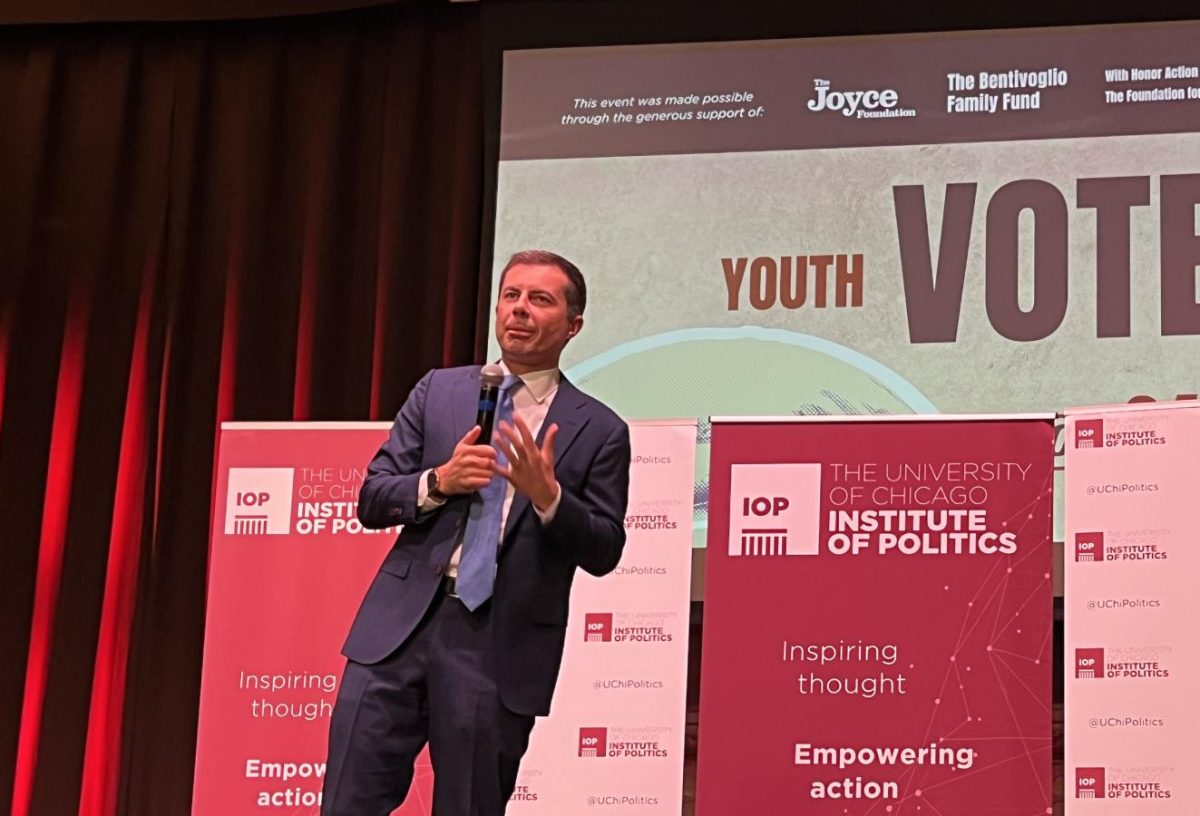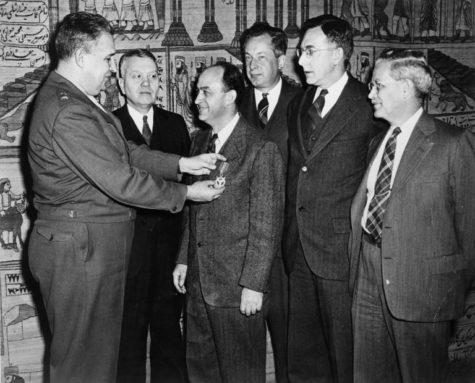Day three of the DNC featured a speech from vice-presidential nominee and Minnesota Governor Tim Walz after high-profile figures, including former president Bill Clinton and Speaker Emerita Nancy Pelosi, took the stage at the United Center. Here’s what UChicago students and the Institute of Politics (IOP) were up to.
U.S. Secretary of Transportation Pete Buttigieg and Chicago Mayor Brandon Johnson were among numerous high-profile speakers at Youth Votefest, an event organized by the IOP consisting of a series of talks and workshops intended to help attendees increase youth political engagement. The IOP held another Votefest this July in Milwaukee during the Republican National Convention.
Prior to taking the stage at the Democratic National Convention Wednesday night, Buttigieg held a Q&A session at Votefest with the audience. According to an email from the IOP about the event, the event brought together 300 students from 120 schools across the U.S. In a speech before the Q&A, Buttigieg spoke about how Democrats had begun to take back the concept of “freedom” from Republicans in their messaging.
“[Republicans] miss sometimes the fact that government is not the only thing that can make you un-free. Your cable company can make you un-free. Your neighbor can make you un-free,” Buttigieg said. “And often, good government is about making sure that our freedom is enhanced through good policy intervention.”
Buttigieg, in response to an audience question about why he chose to appear on conservative television channels such as Fox News, said he wanted Democrats’ messaging to reach voters it wouldn’t otherwise reach, promoting healthier conversations.
“I never thought that I would be a Fox News frequent flier… but the reason I do it is because I think it’s important, as your question suggested, to meet people where they are and recognize that I can’t be mad at somebody for not embracing our message if they’ve literally never heard it,” Buttigieg said.
During a live episode taping at the Votefest, the New York Times’ “The Run-Up” host Astead Herndon spoke to Brandon Johnson about progressivism, political engagement among young people, and the passing of the torch in the form of the Democratic nomination from President Joe Biden to Vice President Kamala Harris.
“For someone to have the torch passed to them, it has to be already lit,” Johnson said. “The torch is already lit. We just needed somebody who can run—I love you, Joe—but someone who can run just a little bit faster.”
Johnson also said he felt the progressive movement is making headway. A former Chicago Teachers Union organizer, Johnson ran on progressive promises but has faced challenges in the past year surrounding crime, transit, and an influx of migrants.
“It’s an exciting time in America, and it’s really a testament to where we are as the overall progressive movement, changing and transforming the minds of people to ensure that working people’s progress is front and center,” Johnson said.
Johnson added that he thought Democrats could win young voters over despite their current and historically lower levels of engagement.
“I’m the mayor of Chicago because young people understand that I’m speaking to the issues that they care about—public accommodations, good schools, good paying jobs, access to education that doesn’t send you into debt,” he said. “As long as we’re speaking the truth, young people are going to move in the direction of truth and justice.”
Other speakers at the event included Cathy Cohen, who is the D. Gale Johnson Distinguished Service Professor of Political Science at the University. Cohen spoke about the GenForward survey, a project she founded and works as a principal investigator for, which researches young Americans’ political attitudes.
Michigan Lieutenant Governor Garlin Gilchrist, former Republican U.S. Representative from Illinois Adam Kinzinger, and U.S. Representative Delia Ramirez (D-Ill.) addressed the audience as well, urging them to continue engaging in—and pushing others to engage in—American democracy.
IOP Director and former U.S. Senator from North Dakota Heidi Heitkamp spoke to the Maroon during Votefest.
“The Institute of Politics takes their role of trying to encourage engagement of young people in our democracy incredibly seriously,” Heitkamp said. “So when we realized that the Republican Convention was going to be in Milwaukee and the Democratic Convention in Chicago, we started rolling up our sleeves, saying, ‘Okay, it’s go time for the University of Chicago.’”
James Marcucci, a second-year Master of Public Policy student at the Harris School of Public Policy who attended Votefest, expressed a passion for youth voter mobilization in an interview with the Maroon.
“I look forward to going back to New Jersey and working to organize voting, and to ensure voting rights and that registering to vote is accessible for all,” Marucci said. “I think it is really necessary and really important. And I think it needs somebody to sort of preach the good word that it has got to be done.”
UChicago’s Bengali students’ association Kheyal held a protest near the DNC on Wednesday in honor of a 31-year-old trainee doctor whom an unidentified perpetrator raped and murdered on August 9 in Kolkata, India.
Kheyal had previously held a vigil on Saturday on Crerar quad. Its organizing is part of a larger wave of protests in the U.S. and across India.
“We demanded justice for the victim and a speedy trial, and we demanded strict punishment for the perpetrators,” said Soumik Ghosh, a member of Kheyal and a fourth-year computer science Ph.D. student. “More broadly, this was a protest against the deeply ingrained patriarchy and the misogyny that’s present in society that makes daily life unsafe for women.”
Regarding why Kheyal held a protest around the DNC in addition to their vigil, Ghosh said the group wanted to keep up the pressure for action and raise the movement’s profile.
“There’s a huge movement that’s happening in Kolkata right now. We wanted to be in solidarity with them. We wanted to let them know that we haven’t forgotten the cause and that we are also fighting for justice here,” Ghosh said. “The second reason was we wanted maximum visibility. We wanted people to know about this incident; we wanted people to know about this movement in the hope that this would help build solidarity for the movements that are happening at home, and that this is going to put pressure on the state government and the police to catch the perpetrator and start a speedy trial.”















